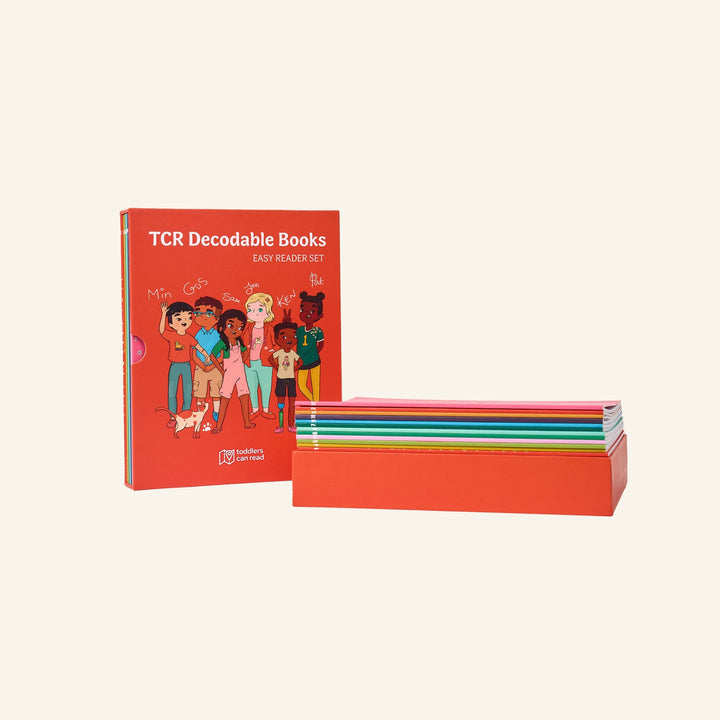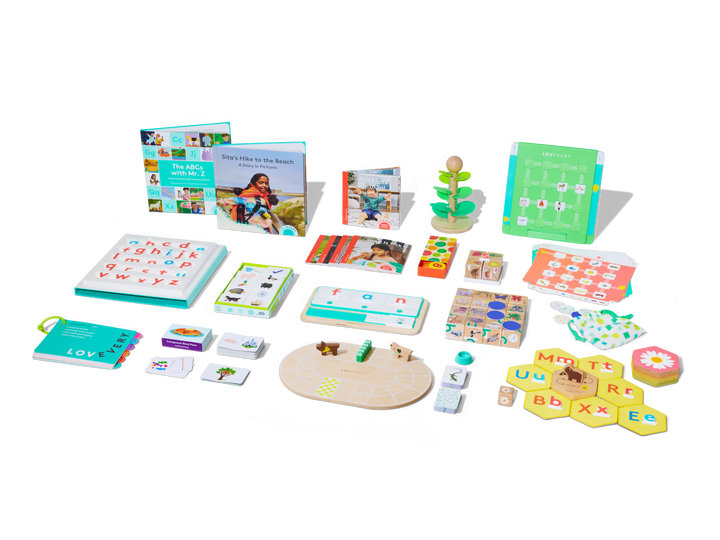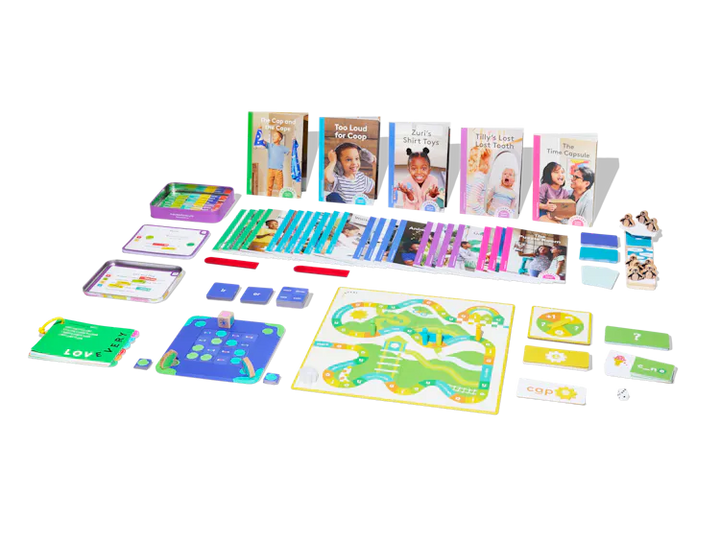Lovevery Reading Skill Set Part 3: Advanced Rules to Chapter Books
Lovevery Reading Skill Set Part 3: Advanced Rules to Chapter Books
1st and 2nd-grade skills
Chapter books, here we come. In Part 3, your child will learn advanced vowel rules—like the final ‘e’ and vowel teams—and common prefixes and suffixes. They’ll also build inference, reading stamina, and comprehension, eventually reading their very first chapter books all on their own.
Only available in the USA & Canada
Couldn't load pickup availability









Games and books that keep your child motivated

Ends with E Adventure Game
Learn when an “e” at the end of a word makes the earlier vowel say its name in this fun family board game.

Final e Book Series
Practice reading words with final e by following Jase, the detective, as he solves mysteries. Use the red decoder to reveal hidden words.

Vowel Team Penguin Walk
Learn how vowels work together to make one sound, and get lots of practice reading aloud while balancing penguins on the iceberg.

Vowel Team Book Series
Focus on 2 specific vowel pairs at a time in each of these 8 books about everyday activities. Use the red decoder to reveal hidden words.

R-Vowel Frog Hop
Build a path of lily pads to beat your opponent to the other side while learning how vowel sounds change when followed by the letter ‘r’.

R-Controlled Vowels Book Series
Learn all about taking care of animals and reinforce r-controlled vowels with this 5-book series, including 1 non-fiction book.

Prefix & Suffix Story Fix
Practice reading longer words with prefixes and suffixes by building silly stories in this interactive game that’s great on-the-go.

Prefixes & Suffixes Book Series
Have a laugh as you read silly stories that feature common prefixes and suffixes in this 5-book series.

Chapter Books
At the end of Part 3, watch your child read their very first chapter books, combining all the skills learned. The longest is 80 pages!

The Play Guide
Learn why each skill matters, how to support your child's reading journey, ideas for practicing skills, and tips to keep play fun.
WARNING: CHOKING HAZARD -- Small parts. Not for children under 3 years
Inside Part 3: Advanced Rules to Chapter Books
Common Questions
Is The Reading Skill Set a subscription?
The Reading Skill Set is not a subscription-it's broken into 3 parts and designed to move at your child's pace. You can start with the individaul part your child is ready for, or get the complete set at a discount.
Should I wait until my child finishes their Play Kits Subscription before starting The Reading Skill Set?
There’s no need to wait. Lovevery is a complete early learning system, with The Play Kits focused on stage-based, holistic development, and The Reading Skill Set focused specifically on early literacy skills. Your child can have fun and learn with The Reading Skill Set and The Play Kits at the same time.
What age or grade is The Reading Skill Set for?
Each child progresses at their own pace. No matter the grade-level of your child, studies show that re-visiting sound and foundational phonics skills can help increase confidence and fluency. The grade levels listed below are for reference, but you should start with the part that is the best fit for your child’s current skill level.
- Part 1: Skills often taught in Pre-K and Kindergarten
- Part 2: Skills often taught in Kindergarten and 1st grade
- Part 3: Skills often taught in 1st and 2nd grade
Why did Lovevery take a phonics-based approach to reading?
Research shows that incorporating structured phonics is the most effective approach for learning to read, especially for children experiencing difficulty. However, since reading is a complex process, it’s critical that additional skills—such as oral language, fluency, vocabulary, background knowledge, and phonemic awareness—are supported as well.
Learn more about the research:
Ehri, Linnea. “Teaching Phonemic Awareness and Phonics: An Explanation of the National Reading Panel Meta-Analyses.” In The Voice of Evidence in Reading Research, edited by Peggy McCardle and Vinita Chhabra, 153–186. Baltimore, MD: Paul H. Brookes Publishing Co., 2004.
Ehri, Linnea. “The Science of Learning to Read Words: A Case for Systematic Phonics Instruction.” Reading Research Quarterly 55, no. S1 (2020): S45–S60.
National Reading Panel (U.S.) and National Institute of Child Health and Human Development (U.S.). Report of the National Reading Panel: Teaching Children to Read: An Evidence-Based Assessment of the Scientific Research Literature on Reading and its Implications for Reading Instruction. Washington, DC, 2000.
Regional Educational Laboratory Southeast at Florida State University. “What Does 20 Years of Research Say About Teaching Language and Literacy in Preschool?” U.S. Department of Education, Institute of Education Science, 2021.
How much parent involvement is needed to successfully complete this program?
We designed many of the games to be self-correcting (your child can check their own answers) and to be played independently so that you’re not expected to become a reading teacher. As a parent, you’ll need to introduce or set up each product to get them started. Plus, the multiplayer games are fun for families to play together, so they won’t feel like work.
The Play Guide that comes with each part includes helpful scripts to introduce new skills as well as guidance on what to say when your child makes a mistake.















